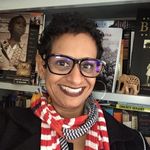Arts & Sciences is committed to cultivating and advancing a diverse and inclusive community capable of recognizing, analyzing, and responding to exclusion and injustice with equitable solutions, and to building community in ways that celebrate the racial, cultural, ethnic, religious, ability, sexual orientation, and gender diversity of our campus. Here are some other examples of strengthening diversity and inclusion in our community.

What Beetles Can Teach Us About the Importance of Diversity
For Lynette Strickland, assistant professor of biological sciences, studying diversity in nature and promoting it in society go hand in hand. Her personal experiences led her to question the assumption that the Panamanian tortoise beetles weren’t related. For science to answer the world’s most pressing questions, she says, “We need people who are different, who have different perspectives and different backgrounds.”

The Quotidian of Black Life
While working on her PhD, Associate Professor of History Paula Austin found interviews of Black teenagers living in Washington, D.C., in the 1930s. The teens shared their experiences of being young, poor, and Black within the confines of Jim Crow laws. As Austin examined the archival materials, she asked herself why the young people’s ideas—their mundane lives—couldn’t be considered “intellectual history?”
Incorporating Non-Binary Pronouns in the French Classroom
In French Lecturer Maria Bobroff’s classroom, students are intermixing the non-binary and iels pronouns with feminine and masculine pronouns and sharing their pronouns — in both English and French.

BU Students Flock to CAS Course on Israeli-Palestinian Conflict
To satisfy demand, the college added a third section ofCAS HI 393/ CAS JS 286: Israeli-Palestinian Conflict, which delves into conflicting narratives through primary sources and film. Students present their own reflections on the conflict and debate possibilities of resolution.
Terriers in Charge: Sindhu Rayapaneni
Sindhu Rayapaneni (CAS`24) serves as the inaugural diversity, equity, and inclusion chair for the BU chapter of It’s On Us, a national organization dedicated to stopping sexual assault on college campuses.
Memory Serves Them Well
Neuroscientist Steve Ramirez has built a diverse, vibrant community of young scientists in his memory lab. In October 2022, Ramirez received a $1.15 million Chan Zuckerberg Initiative Science Diversity Leadership Award, recognizing his mentorship of students from underrepresented backgrounds and his promotion of a culture of diversity, equity, and inclusion.

New Community Impact Award celebrates student advocacy
Women’s, Gender, and Sexuality Studies Program (WGS) has created a new Community Impact Award to honor students serving marginalized communities through their advocacy and research. The inaugural awardees are Bahar Aldanmaz, a doctoral candidate in sociology who researches and advocates for menstrual justice and global health and co-founder of an organization dedicated to ending “period poverty” in Turkey, and Shre Venkatesan (CAS’25), an economics and sociology major whose research focuses on estranged students’ access to healthcare, specifically in marginalized communities.

Discovery of widespread coral diversity may change conservation efforts
There may be many more species of coral than we ever imagined. Assistant Professor of Biology Sarah W. Davies, along with postdocs Carsten G. B. Grupstra and Hannah E. Aichelman (GRS`23), James Fifer (GRS`23), and a team of researchers from URI and WHOI say they have found evidence of at least 24 examples around the world where coral with similar appearances live on the same reef, but have different DNA.

Designing a Curriculum for Multilingual Writers
How does linguistic justice manifest? How do you write through an antiracist lens? What does “standard English” look like? CAS WR 112, “Critical Literacies for Multilingual Writers,” the newly revamped introductory writing course for English-language learners (ELL) in the College of Arts & Sciences Writing Program, brings these topics to the forefront of academic writing, while also adopting a new placement method for international students in ELL courses. These tandem changes to the Writing Program are reflective of university-wide efforts to focus on student-led learning.


